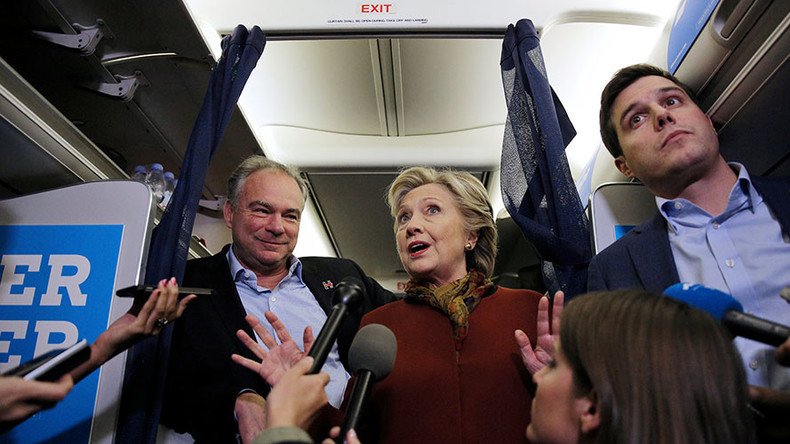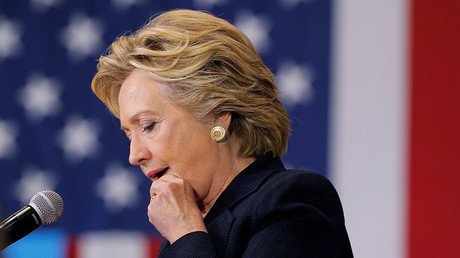WikiLeaks releases latest batch of #PodestaEmails from Clinton campaign chair

WikiLeaks has published its 24th batch of emails from the hacked account of Hillary Clinton’s campaign chair John Podesta.
The organization has released more than 39,000 emails from Podesta’s account and has pledged to bring the total number up to 50,000 before the November 8 election.
Best of the worst: Here are the most shocking WikiLeaks #Podesta emails so far https://t.co/8k0EtJ3TVv
— RT America (@RT_America) October 21, 2016
Among the revelations from Sunday’s tranche of leaked emails was the Clinton campaign team’s suspicions that the House Select Committee on Benghazi Chairman, Republican Trey Gowdy, was selectively leaking information from the committee.
Other emails released Sunday included a conversation between Podesta and Chelsea Clinton on ‘compromised’ technology during visits to China, while another chain of emails offered insight into Podesta’s own doubts on Hillary Clinton’s chances of securing the Democratic nomination.
READ MORE:#PodestaEmails23: WikiLeaks releases new mails from Clinton chair
Avoiding media 'gaggle'
An email from The Hill columnist Brent Budowsky dated May 21, 2015 explains the Clinton campaign’s months-long avoidance of press conferences.
“What I would suggest avoiding is a format where she walks up to the gaggle, with questions virtually shouted and microphones thrust in her face, that looks like a perp walk,” Budowsky wrote to Podesta. “And minimize the podium style news conference whenever possible.”
He suggested a “conversational format” where Clinton would sit at a table with a score of reporters instead.
“He can be annoying, but this actually makes sense to me,” Podesta wrote, forwarding the message to Deputy Communications Director Kristina Schake.
“It is definitely something we want to try,” Schake replied, adding that after Iowa and New Hampshire, Communications Director Jennifer Palmieri said “we need to find a better avail [sic] set up that isn't so awful for HRC.”
Weiner worries
Future Clinton staffers were aware of problems with Anthony Weiner as early as 2011, an email from Monday’s WikiLeaks release shows.
“Oof,” Palmieri wrote to Podesta and Tanden – all of whom worked at the Center for American Progress at the time – on June 10, 2011, forwarding a Fox News story about police in Delaware questioning Weiner about messaging a 17-year-old girl.
WATCH MORE: Weiner sexting scandal enters election
‘As much fun as the FBI’
Among Monday’s revelations was an email exchange from January 2009, as Podesta was finalizing his work at Barack Obama’s Presidential Transition Team (PTT). Ahead of his return to CAP, the organization’s General Counsel Debbie Fine sent out some questions to sort out the potential conflicts of interest.
“You are as much fun as dealing with the FBI,” Podesta replied. “Why don't you tell me what you want the answers to those questions to be.”
“ouch. wow, i'm not sure which i feel more – the hurt of that comment or the shock at having the opportunity to shape the outcome,” Fine replied.
The experience does not seem to have soured Fine’s professional relationship with Podesta, though. She is currently listed as deputy general counsel for special projects and research at Hillary for America.
‘Feels consistent’
On November 4, 2015, senior campaign adviser Karen Finney put out a call for an op-ed that would promote Clinton to the African-American community ahead of a MSNBC forum in South Carolina.
After many iterations, Kristina Costa proposed an introduction (co-authored by main Clinton speechwriter Dan Schwerin) saying that Clinton went into public service “to tear down the barriers that hold people back from developing their talents and achieving their dreams.”
“My only concern is we keep rewriting the reason why she started in a public service. Isn't this the third variation on this?” asked pollster Joel Benenson.
“We've used this language in a number of places, feels consistent,” replied Finney.
WikiLeaks emails have also revealed that many communications purporting to come directly from Clinton – such as tweets signed with “-H” and blog posts – are actually written by committee. One example from Monday’s batch is the making of a March 12, 2016 Medium post about HIV and AIDS.
Clinton’s remarks praising Nancy Reagan at the former first lady’s funeral raised eyebrows in the LGBT community, and Clinton’s staff went into full damage control mode. Dozens of staffers were involved in proposing a blog post that would pivot away from Clinton’s words to “something else – maybe… celebrating the people who really did start a national conversation on AIDS,” in the words of Teddy Goff, which turned out to be the subtitle of the Medium article.
Starting with LGBT outreach coordinator Dominic Lowell, the thread eventually involved Christina Reynolds, Xochitl Hinojosa, Kristina Schake, Dennis Cheng, Robby Mook, Jake Sullivan, and the eventual authors, Megan Rooney and Lauren Peterson.
Rooney and Peterson are credited with “great work” and a “pretty amazing” article (Schwerin), and Palmieri seconding that with “Praise, Jesus!”
“Whatever we did to send our LGBT talking points to folks has really worked, they are popping up everywhere on the supporter Facebook groups,” chimes in another staffer, Jessica Morales Rocketto.
POLL: 45% say Clinton emails are worse than Watergate scandal https://t.co/tWwwEWwfsSpic.twitter.com/hjLFe4uhim
— RT America (@RT_America) October 31, 2016
‘Seems shady’
In May 2015, when longtime Clinton partisan David Brock announced he was spinning off Correct the Record into a separate superpac to work closely with the Clinton campaign, Podesta’s associates at the Center for American Progress were doubtful.
“This makes zero sense to me,” ThinkProgress editor Judd Legum wrote to CAP President Neera Tanden, in an email headlined simply “Why?”
“I'm not their biggest fan,” Tanden replied, “But this does seem shady.”
“Brock $ machine!” Podesta fired back.
“That's fine,” said Tanden. “But skirting if not violating law doesn't help her.”
Though federal law explicitly prohibits superpacs from coordinating with individual campaigns, Brock argued that the ban applied only to paid political advertising, citing a 2006 Federal Election Commission “internet exemption” that ruled free online content does not count as campaign expenditures.













